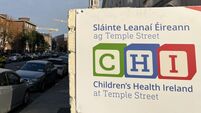Government to crack down on non-compliance with child maintenance orders

The review recommends strengthening the attachment of earnings order and exploring the possibility of attaching an order to a PPS number rather than employing entities. File photo: iStock
The Government is planning to take a tougher line when it comes to the enforcement of Child Maintenance orders.
A new review by the Department of Justice includes 26 recommendations to improve the current system, focusing mainly on compliance and deterrence.














